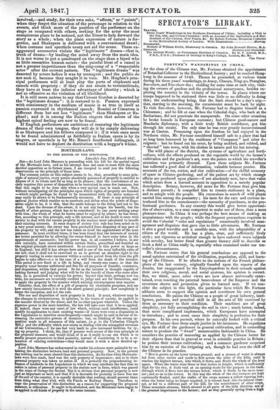MORTMAIN-LAWS.
TO THE EDITOR OF THE SPECTATOR.
Lincoln's Inn, 27th March 1847. Sin—As Lord John Manners is proceeding with his bill for the partial repeal of the Mortmain-laws, and as his attempt does not seem to meet with the same decided opposition as in former years, I am tempted to send you the following observations on the principle of those laws.
The common notion on this subject seems to be, that, according to some prin- ciple of natural justice, every person absolutely possessed of property is entitled to dispose of it to whom and for as long as he pleases; that the convenience of so- ciety requires this power of disposition to be restrained in some few instances, but that this ought to be done only when a very special case is made ant. Now, without investigating all the principles upon which rights of property are founded —which might perhaps be found to be inconsistent with the above notion—it may easily be shown to be fundamentally erroneous. If there is any principle of natural justice which enables us to ascertain and define what the power of dispo- sition ought to be, it is this, that the earth belongs to the living and not to the dead. Upon the decease of the owner, it is not any longer his benefit, but the benefit of other persons, which has to be considered: he can carry nothing away with him; the whole of what he leaves must be enjoyed by others; he has there- fore, according to this principle, only a life interest, and at his death it rests with society to deal with the vacant property in the manner most calculated to benefit their existing interests. In some stages of society this rule has been acted on to a very great extent; the owner has been precluded from disposing of any part of his property by will; and the law has taken on itself the appointment of the next possessor. In more civilized times, it has been found that the interests of society are better provided for by allowing the owner himself to have some voice in the appointment of successors; but his power has, in all countries I believe, in our own certainly, been restrained within certain limits, prescribed and founded on the original principle above mentioned. In no country is this power so large as in England; but still it has always been and is one of the most inflexible rules of our law, that it shall not be exercised so as to prevent an absolute right to the property vesting in some successor within a certain period from the time the gift ine to take effect—i. e. in the case of a will from the death of the testator. This period is now fixed at a life in being, and twenty-one years; so that the property must become unfettered and free for all purposes of transfer, commerce, and disposition, within that period. So far as the testator is thought capable of looking forward andjudging what will be for the benefit of those who come after him, he is permitted to exercise his power; beyond that limit, perhaps now too wide, his successors are invariably enabled to .judge and act for themselves, and to apply the property in the manner which existing circumstances may require. Consider, then, the effect of a gift of property for charitable purposes, and see how utterly inconsistent it is with the above general principle; how completely it forms the exception, and not the rule. The use and disposition of such property. is fixed. It must, whatever may be the changes in circumstances, in opinions, in the wants of society, be applied in the manner directed by the donor, and for no other purpose whatever. Unless the supreme power in the state interfere, the law will take care that it be so applied. If, indeed, there were any court of law which, without such interference, could modify its application to meet existing wants—if there were even a disposition in the Legislature to interfere more frequently—much might be said in favour of in- creasing the restrictive powers of testators: but, on thinking of the strong op- position made to all measures of this nature, (a g. to the Unitarian Chapels Bill,) and the difficulty which now exists in dealing with the misapplied revenues of our Universities,—I for one feel very loath to give increased facilities for ty- ing up property. I think, Sir, that if persons were aware of the true principle of the proposed measure, and would think of it as it really is—as one which is to enable present possessors to bind posterity, instead of considering it to be a re- laxation of existing restrictions—they would meet it with a more decided op- position. Lord John Manners has endeavoured to render his scheme more palatable by re- taining the distinction between land and personal property. Now, in the present day nothing can be more absurd than this distinction. At the time when Mortmain- laws were first made, land was the only property of importance; and so in them personal property was taken no notice of. It is probably the preponderating in- fluence of landlords in the Legislature to which we may attribute the fact that no notice is taken of personal property in the statute now in force, which was passed in the reign of George the Second. But it is obvious that personal property is now just as important as land; and that if it is desirable for posterity to have free use of the soil of the country, it is equally, desirable that nothing should prevent them from doing what they wish with the Funds or Railway Shares. Therefore, to urge the preservation of this distinction as a reason for supporting the proposed measure, is ridiculous. It ought to be abolished, and the Mortmain-laws ongot to be applied to all kinds of property in the same manner. F.


































 Previous page
Previous page